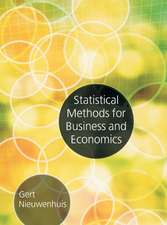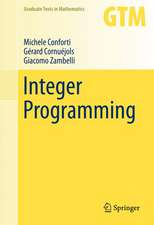Toward Interactive and Intelligent Decision Support Systems: Volume 2 Proceedings of the Seventh International Conference on Multiple Criteria Decision Making Held at Kyoto, Japan August 18–22, 1986: Lecture Notes in Economics and Mathematical Systems, cartea 286
Editat de Yoshikazu Sawaragi, Koichi Inoue, Hirotaka Nakayamaen Limba Engleză Paperback – 8 apr 1987
| Toate formatele și edițiile | Preț | Express |
|---|---|---|
| Paperback (2) | 651.84 lei 6-8 săpt. | |
| Springer Berlin, Heidelberg – 8 apr 1987 | 651.84 lei 6-8 săpt. | |
| Springer Berlin, Heidelberg – 8 apr 1987 | 651.99 lei 6-8 săpt. |
Din seria Lecture Notes in Economics and Mathematical Systems
-
 Preț: 360.02 lei
Preț: 360.02 lei -
 Preț: 279.18 lei
Preț: 279.18 lei -
 Preț: 383.93 lei
Preț: 383.93 lei -
 Preț: 384.09 lei
Preț: 384.09 lei -
 Preț: 380.07 lei
Preț: 380.07 lei -
 Preț: 446.26 lei
Preț: 446.26 lei -
 Preț: 497.37 lei
Preț: 497.37 lei -
 Preț: 380.84 lei
Preț: 380.84 lei -
 Preț: 384.86 lei
Preț: 384.86 lei -
 Preț: 378.34 lei
Preț: 378.34 lei -
 Preț: 399.67 lei
Preț: 399.67 lei - 20%
 Preț: 360.93 lei
Preț: 360.93 lei - 15%
 Preț: 643.16 lei
Preț: 643.16 lei -
 Preț: 379.09 lei
Preț: 379.09 lei -
 Preț: 404.74 lei
Preț: 404.74 lei -
 Preț: 385.62 lei
Preț: 385.62 lei - 15%
 Preț: 644.49 lei
Preț: 644.49 lei -
 Preț: 379.09 lei
Preț: 379.09 lei -
 Preț: 345.50 lei
Preț: 345.50 lei -
 Preț: 425.80 lei
Preț: 425.80 lei -
 Preț: 378.34 lei
Preț: 378.34 lei - 18%
 Preț: 775.65 lei
Preț: 775.65 lei -
 Preț: 392.60 lei
Preț: 392.60 lei -
 Preț: 401.61 lei
Preț: 401.61 lei - 15%
 Preț: 646.43 lei
Preț: 646.43 lei -
 Preț: 382.18 lei
Preț: 382.18 lei -
 Preț: 378.34 lei
Preț: 378.34 lei - 15%
 Preț: 637.59 lei
Preț: 637.59 lei - 15%
 Preț: 647.27 lei
Preț: 647.27 lei -
 Preț: 377.73 lei
Preț: 377.73 lei -
 Preț: 447.84 lei
Preț: 447.84 lei - 15%
 Preț: 644.49 lei
Preț: 644.49 lei -
 Preț: 386.00 lei
Preț: 386.00 lei - 15%
 Preț: 654.43 lei
Preț: 654.43 lei -
 Preț: 415.02 lei
Preț: 415.02 lei -
 Preț: 411.54 lei
Preț: 411.54 lei -
 Preț: 398.92 lei
Preț: 398.92 lei -
 Preț: 398.92 lei
Preț: 398.92 lei -
 Preț: 392.75 lei
Preț: 392.75 lei - 15%
 Preț: 635.47 lei
Preț: 635.47 lei - 20%
 Preț: 653.56 lei
Preț: 653.56 lei -
 Preț: 379.86 lei
Preț: 379.86 lei -
 Preț: 495.46 lei
Preț: 495.46 lei -
 Preț: 447.99 lei
Preț: 447.99 lei -
 Preț: 378.71 lei
Preț: 378.71 lei - 15%
 Preț: 637.13 lei
Preț: 637.13 lei -
 Preț: 385.84 lei
Preț: 385.84 lei -
 Preț: 378.54 lei
Preț: 378.54 lei - 15%
 Preț: 666.55 lei
Preț: 666.55 lei
Preț: 651.99 lei
Preț vechi: 767.05 lei
-15% Nou
Puncte Express: 978
Preț estimativ în valută:
124.82€ • 128.43$ • 105.21£
124.82€ • 128.43$ • 105.21£
Carte tipărită la comandă
Livrare economică 01-15 martie
Preluare comenzi: 021 569.72.76
Specificații
ISBN-13: 9783540177197
ISBN-10: 3540177191
Pagini: 468
Ilustrații: XII, 452 p.
Dimensiuni: 170 x 244 x 25 mm
Greutate: 0.74 kg
Ediția:Softcover reprint of the original 1st ed. 1987
Editura: Springer Berlin, Heidelberg
Colecția Springer
Seria Lecture Notes in Economics and Mathematical Systems
Locul publicării:Berlin, Heidelberg, Germany
ISBN-10: 3540177191
Pagini: 468
Ilustrații: XII, 452 p.
Dimensiuni: 170 x 244 x 25 mm
Greutate: 0.74 kg
Ediția:Softcover reprint of the original 1st ed. 1987
Editura: Springer Berlin, Heidelberg
Colecția Springer
Seria Lecture Notes in Economics and Mathematical Systems
Locul publicării:Berlin, Heidelberg, Germany
Public țintă
ResearchCuprins
I. Intelligent Decision Support Systems.- An Interactive Knowledge Support System with Imperfect Information: Toward a Microcomputer Implementation of ARIADNE.- Object Model for a Deep Knowledge System.- A Distributed Problem Solving Approach to Control Asynchronous and Concurrent Processes.- A Human-Friendly Interface System for Decision Support Based on Self-Organized Multi-Layered Knowledge Structures.- Intelligent Decision Support for Technology Assessment.- A Framework for Choosing the Most Appropriate Discrete Alternative Multiple Criteria Decision-Making Method in Decision Support Systems and Expert Systems.- The Intelligent Decision Support System: Synthesis of a Decision Support System and an Expert System.- A Decision-Support System for Systems Engineering and Management: The SEMS Experiment at NASA.- To Solve Discrete Multicriteria Decision Problems Based on Logic-Based Decision Support Systems.- MCDM: From ‘Stand-Alone’ Methods to Integrated and Intelligent DSS.- Development of a Diagnosis Analysis System for Ion Implanter.- A Multiple Criteria Algorithm for Automatic Layout of Data Flow Diagrams.- On the Method to Arrange and Use Expertise.- Intellectual Distributed Processing System Development.- Japanese-English Machine Translation System Implemented in the Personal Computer.- II. Utility and Risk Analysis.- Multiattribute Utility and Derived Utility.- Applications of Utility Theory in Artificial Intelligence Research.- Portfolio Risk Aversion and Weighted-Utility Theory.- Expected Utility with a Threshold Function.- Risk Management in a Hierarchical Multiobjective Framework.- A Land Use Model for Spatial Policy Analysis and Multi-Criteria Evaluation of Regional Development Planning.- Multiattribute Utility Modeling of Cardiac Health Effects fromCarbon Monoxide Exposure.- III. Value Analysis and Intensity of Preference.- On a Measurable Value Function under Risk: A Descriptive Model of Preferences Resolving the Expected Utility Paradoxes.- Intensity of Preference.- Verifying Preference Separability for Additive Value Functions.- IV. Hierarchy Analysis and Weighting Methods.- The General Case of Dependence in Hierarchic Decision Theory.- The New Dynamic Priorities Model and an Analysis of China’s Energy Strategy for the Future.- Evaluation of Cardinal Utility Based on Weighted Paired-Comparisons.- Design of a Decision-Support Workstation System for Hierarchical Multiobjective Inventory Control.- A Rationale for Additive Decomposition in Multiattribute Utility Assessment.- An Approach to Preference Vector Derivation Using Geometric Least Square.- Assessing Weights by Means of Pairwise Comparisons.- Bias in Assessment of Attribute Weights.- V. Incomplete Information.- Bicriterion Decision-Making under Randomness and Worth of Perfect Information.- The Perspective of Possibilistic Models in Decision Making.- An Interactive Fuzzy Satisficing Method for Multiobjective Linear Fractional Programming Problems with Fuzzy Parameters.- Multicriteria Optimization Problems in Statistics.- VI. Group Decisions.- A Prototype Selection Committee Decision Analysis and Support Systems, SCDAS: Theoretical Background and Computer Implementation.- Scalarization, Optimality Conditions and Group Decision Making.- Two Aspects of Group Decision Support System Design.- Multi-Person Decision Support with Knowledge Base Systems.- Socio-Economic Interpretation of Multiple Agents Decision Making by Game Theory.- Microcomputer — Based Games for the Purposes of Environmental Protection and Managemental Training.- Interactive Modeling andGaming-Simulation for Group Decision Making.- Multiactor Decision Analysis for Regional Investment Allocation.- Appendices.- 1. Softwares in Computer Demonstration Session.- 2. List of Participants.- 3. Organization.- 4. List of Sponsors.











